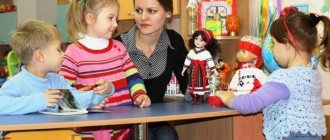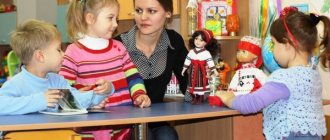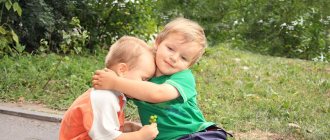Family moral education and development of children plays an extremely important role in the life of every person, largely because its tasks include instilling in the child basic moral qualities, ideas about right and wrong, acceptable and unacceptable forms of behavior. And no matter how strong the influence of the media, environment, etc. on the child, it is the family that is able to lay in the child’s mind strong ideas about education, morality and spirituality in general, which will give him the opportunity to resist many negative factors from the outside.
Moral education begins in the family
In order to understand how to most effectively build family-moral education, we will need to delve deeper into this concept. What is family and moral education of a child?
Family and moral education and the factors that determine it
Spiritual and moral education of the individual is a process of directed formation of a child’s basic personal culture, which contributes to the formation of his personality. The child learns those values and ideals that in the future will shape his worldview and life position, which he will adhere to in the future.
Goals of family and moral education
In order for the moral education of children to be given to the family as effectively as possible, it is necessary that both the family and the school, as well as the child’s immediate environment and society as a whole, take part in it. However, it should be noted that it is the family that will play the dominant role in this matter.
The main method that will be used by parents in the process of family and moral education is a personal example demonstrated to the child in everyday life.
Children copy the behavior of their parents
Starting from a very young age, the child begins to unconsciously copy and adopt habits, individual actions, and later the character of those around him. No matter how small a child is, he always very subtly feels the atmosphere prevailing in his family and understands what kind of relationship exists between parents. Every little detail in the family matters - from the behavior of parents with children to the volume of voice and intonation. And every event that a child witnesses can significantly affect both his current condition and his future. The words and actions of parents will play an invaluable role in shaping their children's attitude towards the world around them.
The formation of clear moral attitudes and beliefs is the ultimate goal of moral education.
The basic moral qualities of a person include:
- A sense of truth. The child’s ideas about the world around him, as well as himself, should correspond to reality as much as possible. The pursuit of truth is valuable because on its basis such qualities as conscientiousness, truthfulness and honesty will later develop. These qualities, which are of a social nature, develop on the basis of the innate need for knowledge and the desire to search for truth. The need to cultivate these qualities takes on a special role in preschool childhood, when, in parallel with the rapid development of imagination, the child also exhibits a tendency to lie and pretend. Developing a sense of truth is a delicate process that requires a special sense of tact, mutual trust and common sense from the parent.
Fostering family values
- Feeling of trust. Only those who can give them a sense of security and positive emotions can earn the trust of children. Trust allows the child to open up to the parent, sharing with him his thoughts, feelings and experiences. Trust is built on the basis of a child's positive perception, support and ability to believe in him.
- Sense of justice. This feeling pushes the child to seek the truth, to use available means to make the most optimal and informed decision. The sense of justice is based on a child’s full understanding of good and bad, permissible and forbidden, permissible and impermissible. Important qualities necessary for the formation of a sense of justice are also the child’s ability to objectively self-assess and correctly perceive what is happening.
- Feeling of empathy. This quality gives the child the opportunity to understand and accept the feelings experienced by the people around him. The ability to sympathize, compassion and empathy suppresses excessive manifestations of selfishness in a child, teaches him selflessness and doing good deeds without expecting praise or encouragement for it. A child with developed empathy is distinguished by the ability to look at a situation from different angles, recognizing the truth of each side of the situation.
- Feeling of sympathy. This feeling makes it possible to make a choice in favor of this or that person in the family and immediate environment, based on personal preference. A child’s sympathy for a particular person depends on how favorable he is to him. A child, as a rule, shows his sympathy in little things, but it is these details, often invisible to the eye, that reveal the true attitude of children towards others.
Guilt often runs in the family
- Self-esteem. Will the child be able to respond appropriately to criticism from people significant to him? And will he be able to be guided by the standards of morality and ethics that are relevant to himself? All this is determined, first of all, by the child’s self-esteem - the ability to defend their rights and protect their own “I” when it is really necessary. Self-esteem can manifest itself and, if necessary, protect oneself as an individual and as a performer of a particular job. Self-esteem is largely based on qualities such as honesty and adequate self-esteem.
- Feeling of self-respect. Self-respect is a quality akin to self-esteem. It is formed through the development of positive qualities in a child and their recognition by adults. Self-esteem is affected both by the child’s self-esteem and by other children’s perception of him. Family and moral education, among other things, should help the child gain confidence in himself and his abilities.
Attitudes towards good family need to be formed in a child from a very early age. He must clearly understand how to benefit those who need it well.
Self-esteem is one of the most important things in life.
It is especially important to emphasize that it is good actions, and not talk about good behavior, that can influence what happens around.
Is it important to raise children morally?
Moral education of children involves influencing the child from family, school and society with the aim of developing moral qualities, behavior and feelings in him. Imitation is the basis of all learning for a young child. The baby understands what the atmosphere is in the family, the relationship between parents. He senses the tone of their conversations. What happens within the family cannot but affect the child. It is from here that he takes the habits of his behavior and attitude towards the world.
Moral education involves the formation of moral beliefs in a child. One of them is responsiveness. It is about understanding the needs and condition of another person. Responsiveness is empathy, a desire to help, which makes the child sensitive to other people's problems. Fostering responsiveness in the family involves instilling in a little person the skill of caring for loved ones and respecting their desires and feelings.
Even in early childhood, it is necessary to form a good attitude in the child. It is important to explain to him how to benefit people well. At the same time, it is necessary to convey that actions are important, not conversations about goodness.
Thus, the moral qualities of children begin to form in the family. They originate from the behavior and example of adults. It is important that the parents’ word is always confirmed by deeds. This is the only way to form the necessary moral qualities in your children.
Raising kids
The formation of moral qualities of an individual begins in early childhood. It is during this period that the child assimilates the first moral requirements and enters the world of social relations. The adult plays a leading role in the formation of the moral qualities of the child, who either copies his behavior or adopts the necessary qualities in the process of communicating with him.
In order for a child’s primary social adaptation to proceed normally, it is necessary to create in him the need to communicate with adults. This stage is the basis for creating a positive attitude towards peers and loved ones. During this period, the little person’s need to imitate and understand speech addressed to him develops. The child must learn to distinguish between “possible” and “impossible”. Early childhood is a period when correct behavior and positive habits are formed.
Emotional communication, which existed between an adult and a baby up to six months, is replaced by substantive communication. By manipulating toys, parents evoke the child’s desire to imitate. During this period, the child develops the qualities necessary for moral education: understanding speech, independent reproduction of actions, meaningful communication with people.
The baby begins to understand words of approval and prohibition only towards the end of the first year of life. Emotionally charged words are perceived by the child more seriously than words spoken without certain facial expressions and intonation. The child willingly plays with objects and repeats the actions of the adult.
The possibilities for the moral education of a one-year-old baby are expanding, since he can already walk and it becomes easier for him to learn about the world and interact with it. The child already understands the adult’s speech well, which allows him to verbally control his behavior. An important aspect of this period is communication not only with adults, but also with peers. On this basis, a friendly attitude towards other children, love for parents and attachment to the teacher is formed.
The formation of correct behavior in a child largely depends on the assessment of an adult. All his actions develop on this basis. If an adult positively evaluates the child’s behavior, he has a desire to do something else good. Punishment causes a feeling of dissatisfaction.
Games will help develop a positive attitude towards peers and the ability to behave correctly in a team. They will also create some discipline among young children. Usually they use such simple games as “Loaf” or “Who is our good one?”
Game "Loaf"
It is usually played by children, but it is also common among schoolchildren. To carry it out, children and an adult are put into a round dance and begin to sing a well-known song:
“Like Nyushina’s (Sasha’s, Katina’s, etc.) name day
We baked a loaf
This height (children stand on tiptoes and raise their arms)
This is the low place (kids should sit down),
This is the width (children spread their arms to the sides, increasing the round dance),
These are the dinners (the round dance narrows)
Loaf-loaf
Whoever you want, choose!”
After this, the driver chooses another child, calling his name, and dances with him in the middle of the circle. And so the game continues until all the children have played.
It is important in raising young children to teach them how to play together and without conflict. An adult must teach children to play with one toy and be able to exchange them. It is important that children can play next to their peers without having their toys taken away from them. That is, play with concentration.
The role of an adult is very important . It teaches the child to have a positive attitude towards other children and imitate them, and develops a desire to take care of them. A teacher or parent shows a sensitive attitude towards peers. He takes pity on a child who is crying, attracts other children to share a toy with him, pat him on the head, and so on.
So, by the end of early childhood, the child learns simple rules of behavior, learns to be in a team, and to carry out instructions from his parents. He develops a positive attitude towards others. The child's behavior is regulated by the adult's assessment. This is how a child develops a feeling of satisfaction with the result that he will receive if he correctly carries out the instructions of an adult.
How to raise preschoolers
The moral education of children in the family should be based on the development in them of a certain system of values, instilling positive actions, which in general creates the right personality. A child will not experience difficulties in communicating with other people if he understands the meaning of words such as kindness, friendship, empathy, love and justice. Properly raised preschoolers are more resistant to stress.
Moral standards are better learned in preschool age, so their education should begin during this period. Patterns of behavior that are established by society will subsequently act as regulators of children’s actions. Properly organized moral education makes it possible to develop in a child a desire to do well, not because of the approval of an adult, but because he wants to do so and knows that it is right.
A friendly attitude towards other children and responsiveness to other people's problems is the center of moral education in preschool age. Emotions play an important role in raising a child. They become more diverse as the baby grows older. Emotions help to form a certain attitude towards reality and reaction to it. The older the child, the richer his emotional sphere. Thus, a preschooler masters verbal and nonverbal means of expressing emotions. He learns to manage them and consciously react to what is happening.
Moral education is present in the life of a child throughout his entire life. The environment in which a child grows and develops is the basis for the moral development of the individual. Therefore, the participation of the family in the formation of the morality of preschoolers is an important point. The child very quickly grasps how parents behave and perceives it as the norm of behavior.
Feelings that then become valuable to the child are formed with the help of adults. They can cause remorse for a bad deed and satisfaction for correct behavior. Therefore, parents need to discuss moral issues with their preschooler, forming in him a system of values and an understanding of right and wrong actions. The most commonly used technique is to discuss the behavior of literary characters and people around the child. Thus, the concept of morality becomes clearer to the baby.
If a child is not taught to understand the feelings of other people in time, a conflictual personality may develop. Therefore, empathy is an important feeling that needs to be developed in a preschooler. Adults should pay attention to the child’s experiences and teach him to express his feelings and emotions in words.
Every year of a child’s life is the fulfillment of different social roles that he tries on: friend, daughter (son), pupil, etc. These roles make it possible to form a moral personality with kindness, care, friendliness, justice and other qualities. The richer the world of roles, the more moral standards the child will learn.
A game will help educate a preschooler. For example, “Piggy Bank of Good Deeds” . The game consists of cutting out squares, circles or other shapes that are interesting to the child from colored paper (an adult can do this). These can also be animal figures. When a child does a good deed, he will have to put one form into the “piggy bank.” This game will serve as a motivation for doing good deeds.
“Compliments” as an example . Children should sit in a circle and hold each other's hands. Each person in turn says a pleasant word to his neighbor, to which he must thank his friend. If a child has difficulty finding words, an adult should help him with this.
What should be instilled in schoolchildren in terms of morality?
Nowadays, moral education becomes a necessity, since the world is filled with cruelty and depravity. Both teachers and parents should pay attention to this aspect in the development of schoolchildren. To protect children from the harsh world, it is necessary to introduce them to moral principles, talk about ethics, and develop correct beliefs.
The center of comprehensive personal development is nothing other than moral education. It is aimed at developing a proper attitude towards the Motherland, others, society and oneself. It teaches you to exist in a team and work.
Any type of education has in its arsenal a set of methods and means of influencing the individual. They are also present in moral development and are aimed at the development of moral judgments, concepts, ideas and assessments. For this purpose, ethical debates and conversations are held. Conducting lectures on ethical topics is not excluded.
Conversations and debates should be conducted in such a way that they do not look like an excessive imposition of one’s principles on children. When talking with schoolchildren, it is necessary to discuss life situations related to morality. The older the child, the more serious topics can be addressed. The content of the conversation should also be guided by the level of moral preparation of children. And of course, we cannot do without discussing issues that concern the schoolchildren themselves.
The teacher plays one of the primary roles in the development of moral ideas and values in school-age children. The success of moral education depends on how the teacher presents the necessary material. Certain principles can only be conveyed to a child through the word, and the teacher has excellent command of this instrument. Conversations on spiritual topics help the student to look at himself with different eyes, to sensibly evaluate his actions, to know and improve himself.
In order for a child to develop successfully, a properly organized moral education of children in the family is necessary. To do this, you need to create a favorable atmosphere around the student. After all, everything influences the formation of his morality: the style of family education, its good and bad sides, the environment in which the child develops.
It must be remembered that the development of morality in a person begins in the family and continues in nurseries, kindergartens and schools. In the latter institute it becomes more focused. Therefore, not only teachers and educators, but also parents should take care of the moral education of children, because morality is not just about improving oneself, but also about changing the entire environment.
In elementary school, the child begins to acquire certain knowledge. But we should not forget that he has already formed some character traits that need to be developed and directed in the right direction. It is at school that the moral character of a student continues to be formed.
A child’s relationship with peers is a necessary development for his moral development. In joint activities with classmates, the child develops the ability to help others, respond correctly to demands and set them himself, survive all failures together and experience the joy of success. Otherwise, a vain, selfish and envious personality will be formed.
The student needs communication with peers. Only in this way will he have a friend with whom he can discuss school issues. A comrade is a friend for him with whom he wants to communicate.
Games contribute to the formation of morality. So, for example, you can play the game “Get rid of anger” . To carry it out, you need to draw blots or clouds in advance, which you then give to the child. You will also need a bag that can be sewn by hand. The child should be asked to put clouds in a bag, talking about his failures and bad deeds that he did today. You need to agree with the child that he puts all his negative emotions in this bag, which then needs to be thrown away.
Invite the children to play Pyramid of Love . The rules are simple: each participant names what he likes and puts his hand in the center of the circle. This creates a pyramid.
Principles of family and moral education
Moral qualities in the family are not innate to a person. For their formation in children, the work of parents and the entire immediate environment of the child is needed. In order for moral education to be carried out as effectively as possible, gently remember the following principles:
Methods of stimulating children
- The principle of unity of word and action. In the event that, while trying to teach children one thing, the parent demonstrates in practice completely different forms of behavior, the child will rather copy the behavioral forms than listen to what he is told.
- The principle of unity of rules and norms. Moral standards adopted in the family must be shared, accepted and supported by both parents, as well as other family members. In the event that a particular act is condemned by some parents, but approved by others, this will inevitably lead to the child beginning to be a hypocrite, accustoming himself to deception and lies.
- The principle of consistency. In order for a child to learn the basic norms and rules accepted in the family, they must be clearly formulated and constant. Of course, as the child grows up and gains independence, many permissions and prohibitions need to be reconsidered. But at the same time, it is unacceptable to change them under the influence of momentary impulses (bad mood, etc.).
- The principle of reasonable encouragement and punishment of children. Family and moral education cannot do without these serious development tools, which must be used as competently as possible. In order for a child to better remember the meaning of moral standards, and for permissions and prohibitions to be better fixed in his mind, it is necessary to use a system of rewards and punishments.
Unacceptable punishments - beatings and insults
However, these parenting tools must be used very carefully. So, the child must necessarily understand why exactly he was punished, or, conversely, why he received praise from the parent.
It is very important to strictly “dosage” both. Too frequent rewards will shift the emphasis of moral education, forcing the child to act in pursuit of exclusively selfish goals. In addition, strong positive incentives make it possible to make only minor progress and learn the most basic actions.
Severe punishments, on the contrary, create a child’s fear of his parents, forcing him to often resort to deception.
Primary social adaptation and its features
As we have already established, early childhood is the age when the basic moral qualities of children begin to form. A unique starting point in the process of moral education is the first moral demands presented to him by his immediate environment and society as a whole. The leading role in the development of a child’s morality is still played by an adult, whose behavior becomes a model for further actions for the child.
Stages of socialization of young children
Thanks to all this, the child is included in a phenomenon called primary adaptation in society. In order for primary social adaptation and its foundations to be as effective as possible, the child must develop a need for communication and interaction with parents. Based on this, in the future he will develop a friendly attitude towards his peers and close people in general. The child begins to “read” verbal and non-verbal signals from them, understand them, and later react and respond to them. In his life, permissions and prohibitions appear and play an increasingly significant role.
The mechanism of understanding what is possible and what is not possible in the future will form the basis for the formation of correct behavior and useful habits.
The role and forms of communication between parents and children
The moral and spiritual foundations of education in every family are laid in the first months of life. Around six months of age, communication between baby and parents begins to undergo some changes. And if earlier it was predominantly emotional, now it is becoming more specific and substantive. By imitating his parents, the child begins to learn new actions and get used to new forms of behavior.
Learning from others - what influences children
In particular, to playful forms of behavior, understanding the meaning and function of speech. The first skills of substantive communication are formed. He will need all these qualities in the future for more effective moral education.
Already at this age, the child begins to learn the first words denoting permission or prohibition for a particular activity. But, a more important role in the perception of speech is still played not by the meaning and meaning of words, but by their emotional coloring. Speech that is not accompanied by a change in intonation or facial expressions will be perceived by him as less emotionally charged. The final meaning of words will be available to the child only by the first year of life. Before this, his behavior will be guided mainly by imitation.
The acquired walking skill also plays a significant role in the moral education of a child. This is explained by the fact that by discovering new possibilities for understanding the world, the child significantly expands his boundaries of knowledge.
More effective control of a child’s behavior and activity is achieved through his understanding of words and speech in general. It is also important that a one-year-old child acquires such qualities as autonomy and the ability to trust, which provides him with the opportunity to go beyond the boundaries of his family. And begin to actively interact with peers and other adults. Expanded communication opportunities form in the child a friendly attitude not only towards his loved ones, but also other people with whom he will interact in everyday life: these include, for example, his friends, other parents, teachers, etc.
The principle of trust is the basis of communication with parents
Basic theories of moral development in the family
1. Jean Piaget's theory of moral development
According to the Swiss psychologist J. Piaget, who purposefully studied the characteristics of child development, there are two periods of moral development of children in the family.
- The first period lasts from birth to seven years. It's called heteronomy. Characterized by the imposition of moral principles on a child.
- The second period is after seven years, called autonomy.
J. Piaget believed that cognitive abilities influence the development of morality in a child. Therefore, in his works he presented a list of age stages, each of which is characterized by the formation of morality. Let's look at the stages in detail.
Sensorimotor stage (up to 2 years):
- the development of motor skills is the ability through which understanding of the world around us occurs;
- the child learns about the world through physical interaction: observes objects, takes them in his hands, examines them closely;
- the baby has an awareness of the “permanence of objects,” in other words, that objects exist even in those moments when he does not visually see, hear, or touch them.
The role of an adult’s assessment in the formation of a child’s moral attitudes
The guiding role in the moral education of a child will be played by the assessment of his behavior and activities by an adult, especially a parent. It is on the basis of approval or censure that the child’s idea of what can be done and what is undesirable will be formed. Praise from adults strengthens children's confidence that the action is positive. This makes him want to do the same in the future. Punishment, on the contrary, causes him a feeling of dissatisfaction and discomfort.
In the future, the assessment of the child’s adult behavior will form the basis for the self-assessment of his actions, which will allow him to adhere to the learned moral standards even in cases where adults are not around.
Ways to develop children
Basic Rules
The correct social and moral education of children in the family must go through three levels; this is the only way to grow a personality resistant to negative influences from the outside.
- The first level is motivation. It is important to create in the child a need for development, a desire to learn norms and moral rules.
- The second level is emotional-sensual. This is the correct education of emotions and sensations.
Feelings such as pity, compassion, empathy, and responsiveness are based on emotions.
The personal example of adults is important here, and not just verbal instructions.
You can cultivate feelings only with the help of affection and support, and not with prohibitions or punishments.
- The third stage is rational. The little person already acquires certain knowledge, norms of behavior, moral principles, and learns to distinguish immoral behavior from moral behavior.
The role of the game in the formation of moral qualities
Not forgetting the extremely important role of play at this stage of development, it is necessary to actively use it in instilling in the child norms of morality and morality. Games allow you not only to simulate situations in which the child will have to show his best qualities and make a choice in favor of a fairer and more correct decision. But also to become accustomed to such phenomena as the distribution of roles, discipline, the rights and responsibilities of each participant in the game action.
Role-playing games - teaching adult life
The education of moral qualities in the family will be simplified if you use the simplest role-playing games.
Over time, the gaming repertoire expands significantly and becomes more complex and varied. leave a comment









